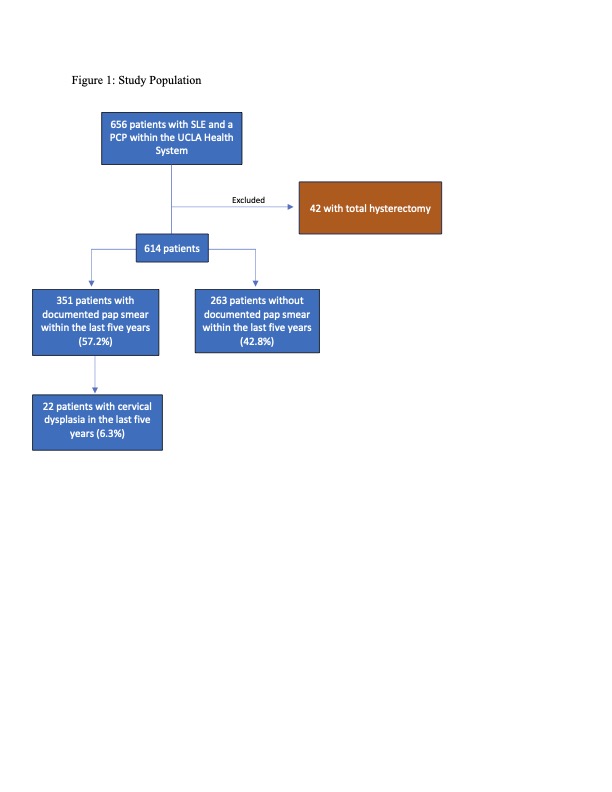Session Information
Session Type: Poster Session A
Session Time: 10:30AM-12:30PM
Background/Purpose: Prior research has outlined an increased incidence of cervical dysplasia and cervical cancer in women diagnosed with systemic lupus erythematosus (SLE). These individuals face an elevated risk due to both their inflammatory disease and the use of immunosuppressive medications, and increased prevalence of human papillomavirus (HPV) infection. The current guidelines from the United States Preventive Services Task Force (USPSTF) advise cervical cancer screening for women aged 21-65 years, with intervals of 3-5 years determined by age and HPV co-testing. Our objective was to evaluate the percentage of women with SLE who underwent documented cervical cancer screening in accordance with these guidelines. We also aimed to understand rates of HPV vaccination in this population.
Methods: This is a single-system retrospective review of female patients ages 21-65 years with a chart diagnosis of SLE between January 2019 and January 2024. Patients had to have a primary care provider (PCP) within fourteen clinic locations of the University of California Los Angeles (UCLA) health system. HPV-co-testing is standard practice in this system and thus we reviewed presence of pap smear within the last five years. Patients with hysterectomy for non-cervical cancer reasons were excluded. We analyzed the proportion of remaining patients for presence of cervical cancer screening, cervical dysplasia. HPV vaccination since 2006 was recorded for this population.
Results: Of the 614 patients included in the final analysis (Figure 1), 351 (57.2%) had age-appropriate cervical cancer screening documented in the medical record. This is in comparison to estimates of age-appropriate screening per USPFTS guidelines of 72.4% of all women nationally. 263 (42.3%) of patients had no prior cervical cancer screening data available in the chart. Of all 351 patients with guideline-appropriate pap smear, 22 (6.3%) were found to have cervical dysplasia. Only 23 patients (3.7%) had ever received at least one HPV vaccination.
Conclusion: Our findings indicate that primary care providers in our health system screen for cervical cancer in SLE patients and vaccinate against HPV at rates below the national average for all women. The current national average for cervical cancer screening is already suboptimal, and it becomes even more concerning for SLE patients due to their elevated risk for cervical dysplasia and cancer. One potential obstacle is a lack of sufficient education about the link between these disease states and the risk of cervical cancer. We suggest a proactive role for rheumatologists in educating both patients and primary care providers on this important topic.
To cite this abstract in AMA style:
Haussmann A, Adu Dapaah E, FitzGerald J, McMahon M. Evaluating the Rate of Cervical Cancer Screening and HPV Vaccination in Women with Systemic Lupus Erythematosus Within a Large Urban Healthcare System [abstract]. Arthritis Rheumatol. 2024; 76 (suppl 9). https://acrabstracts.org/abstract/evaluating-the-rate-of-cervical-cancer-screening-and-hpv-vaccination-in-women-with-systemic-lupus-erythematosus-within-a-large-urban-healthcare-system/. Accessed .« Back to ACR Convergence 2024
ACR Meeting Abstracts - https://acrabstracts.org/abstract/evaluating-the-rate-of-cervical-cancer-screening-and-hpv-vaccination-in-women-with-systemic-lupus-erythematosus-within-a-large-urban-healthcare-system/

